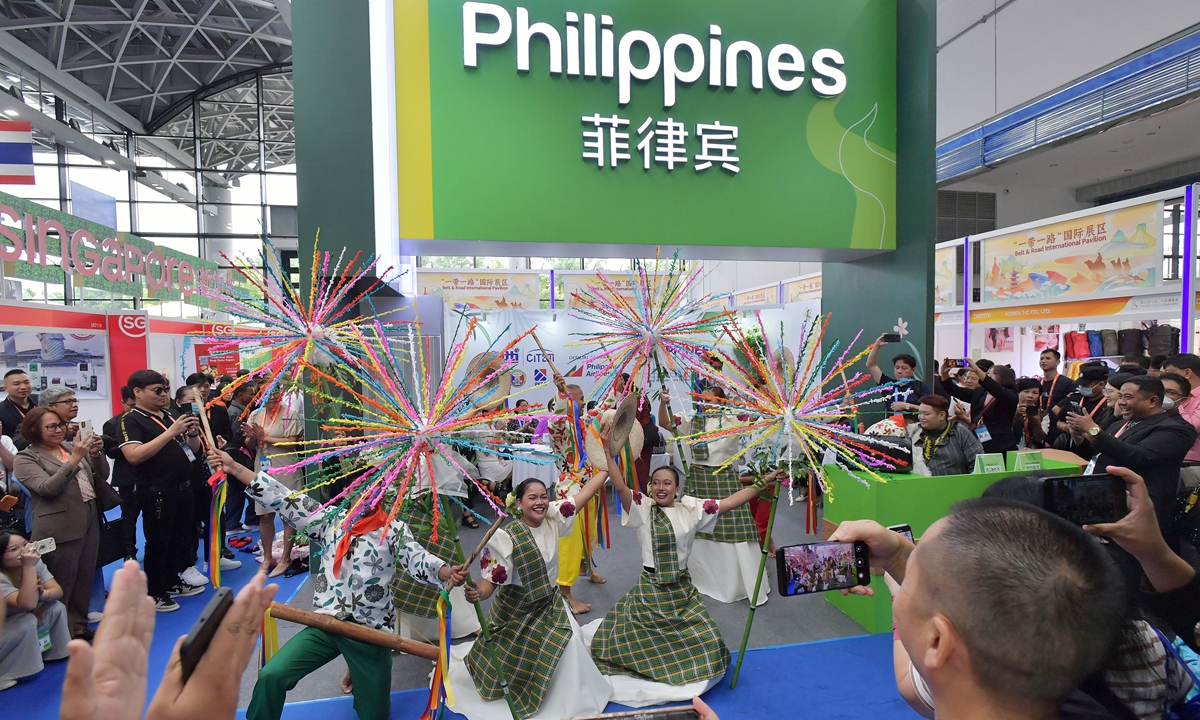
Maynard S. Ngu (Ngu), Special Envoy of the President of the Philippines to China for Trade, Investment and Tourism Photo: Li Hao/GT
Editor's Note:
China and the Philippines are BRI partners. Trade and economic collaboration is central to growing the bilateral ties. In 2022, two-way trade reached $87.7 billion, rising by 7.1 percent. China has remained the Philippines' top trading partner for seven consecutive years. In the face of new circumstances and challenges, economic cooperation is expected to play a pivotal role to accelerate bilateral relationship. In an exclusive interview with Maynard S. Ngu (
Ngu), Special Envoy of the President of the Philippines to China for Trade, Investment and Tourism, Ngu discussed with the Global Times (
GT) reporter Yin Yeping the positive outcomes of their joint construction of the BRI.
GT: President of the Philippines Ferdinand Romualdez Marcos visited China in January, marking his first visit to China since taking office. How do you think both countries should further implement the important consensus reached by the leaders of both nations, strengthen political trust, and guide the bilateral relationship toward higher stability?
Ngu: Both China and Philippines should continue to strengthen political mutual trust by continuing to communicate openly and maintaining a dialogue with transparency and mutual respect to the core interests.
One way to move forward is by finalizing the bilateral investment treaty (BIT) and free trade agreement (FTA) that are currently under negotiation between our two countries. The other is to grow our bilateral ties through inward investments in strategic sectors of the economy such as mining, agriculture and infrastructure.
I believe that investments and a bilateral free trade agreement will help deepen bilateral relationship and to create a win-win situation for both countries.
GT: This year marks the 10th anniversary of the Belt and Road Initiative. How do you assess the achievements made between China and the Philippines in jointly building the initiative?
Ngu: Since its inception, China and the Philippines have achieved significant wins over the past 10 years. Projects under the BRI have helped to improve the Philippines' infrastructure network, boost economic development, and create job opportunities.
Some examples of BRI projects in the Philippines include:
4-lane Estrella-Pantaleon Bridge opened to traffic over the Pasig River in Manila, offering a new route between the urban centers of Makati and Mandaluyong within the Philippines' congested capital;
The Chico River Pump Irrigation Project: This project is expected to irrigate over 80,000 hectares of farmland and provide drinking water to over 2 million people;
The Clark Freeport Zone -- China has invested heavily in the development of the Clark Freeport Zone, which is now a major hub for manufacturing and logistics.
GT: What further opportunities for cooperation do you see between the two countries under the initiative?
Ngu: The Philippine Congress is about to pass a law institutionalizing Public-Private Partnership (PPP) as a mode to build physical and digital infrastructure in the country. This will open up opportunities for private businesses, both foreign and local, between our two countries for increased cooperation and engagement.

Exhibitors from the Philippines perform local songs and dances at the 20th China-ASEAN Expo which kicked off on September 16th, 2023, in Nanning, South China's Guangxi Zhuang Autonomous Region. Photo: VCG
GT: The RCEP came into effect for the Philippines in June this year. How do you evaluate the significance of RCEP in promoting economic and trade development of the Philippines, enhancing its global competitiveness, and strengthening economic and trade connectivity with China in securing regional supply chains?
Ngu: RCEP is considered the world's largest free trade agreement covering roughly 30 percent of the world's population and GDP, and over a quarter of international trade in goods and services, and 31 percent of foreign direct investment inflows. Thus, the Philippines is optimistic that it would bring about increased trade, investment and enhanced competitiveness between our countries. Specifically, RCEP will make it easier and cheaper for businesses in the Philippines and China to trade with each other, strengthening the economic ties between the two countries and making the regional supply chain more resilient.
GT: China has been the Philippines' largest trading partner for seven consecutive years. In 2022, the bilateral trade volume between China and the Philippines reached $87.725 billion. What is your forecast for the figure this year? Could it set a new record? And which products would be the main drivers?
Ngu: We remain optimistic that the bilateral trade volume between the Philippines and China will remain positive over the longer term. In June 2023, China exported $3.84 billion and imported $1.64 billion from the Philippines, resulting in trade deficit of $2.21 billion for the Philippines. These volumes reflect a decrease of 10.2 percent from June 2022, which was the largest decline in our bilateral trade since 2016. This decline is due to a number of factors, including the Philippines strategy of diversifying its trade partners.
The current main drivers of bilateral trade between the Philippines and China are electronics, raw materials, and minerals. We hope to expand the exports of agricultural products and minerals to China.
GT: What opportunities do you see regarding our commerce using local currencies for settlements to promote trade and investment between China and the Philippines?
Ngu: This is mutually advantageous to both our countries and our respective businessmen. In fact, it is my understanding that the Bank of China will make readily available the possibility of opening of a Letter-of-Credit in the Chinese yuan in the Philippines which will make this not only a possibility but a reality.
GT: Which particular area does the Philippines expect more Chinese investment in? Are there any emerging areas for cooperation?
Ngu: We are hoping that the $23 billion in investment pledges made by companies from China during the visit of President Marcos in January would come to fruition. These pledges are for the renewable energy sector, manufacturing, and agriculture.
GT: Both sides have signed a memorandum of understanding on the execution plan for tourism cooperation. With the optimization of China's COVID-19 restrictive measures, cross-border tourism is enjoying a rebound. What are your expectations for drawing more Chinese tourists to the Philippines? And how many Chinese tourists do you expect to draw this year?
Ngu: What we have been doing are mainly three parts:
- Improved visa process
- Increased flights
- More attractive tour packages
We are very optimistic about an increase in Chinese tourist arrivals given our long and historical economic and cultural ties. Although there were at least 75,000 Chinese tourists in the first five months this year, our department of tourism is projecting at least 500,000 tourist arrivals from China this year.
GT: As some external forces are seeking to hype tensions in the South China Sea, how do you think China and the Philippines should respond and continue economic and trade cooperation?
Ngu: Definitely. We should continue and strengthen our economic, trade, cultural and developmental engagements and exchanges. We have so much that we can agree on that will benefit both our countries, and we should not allow one or two differences to affect that, as we continue to mutually respect each other's opposing belief/position while mutually seeking peaceful and diplomatic means of settling whatever disputes or disagreements between us.





